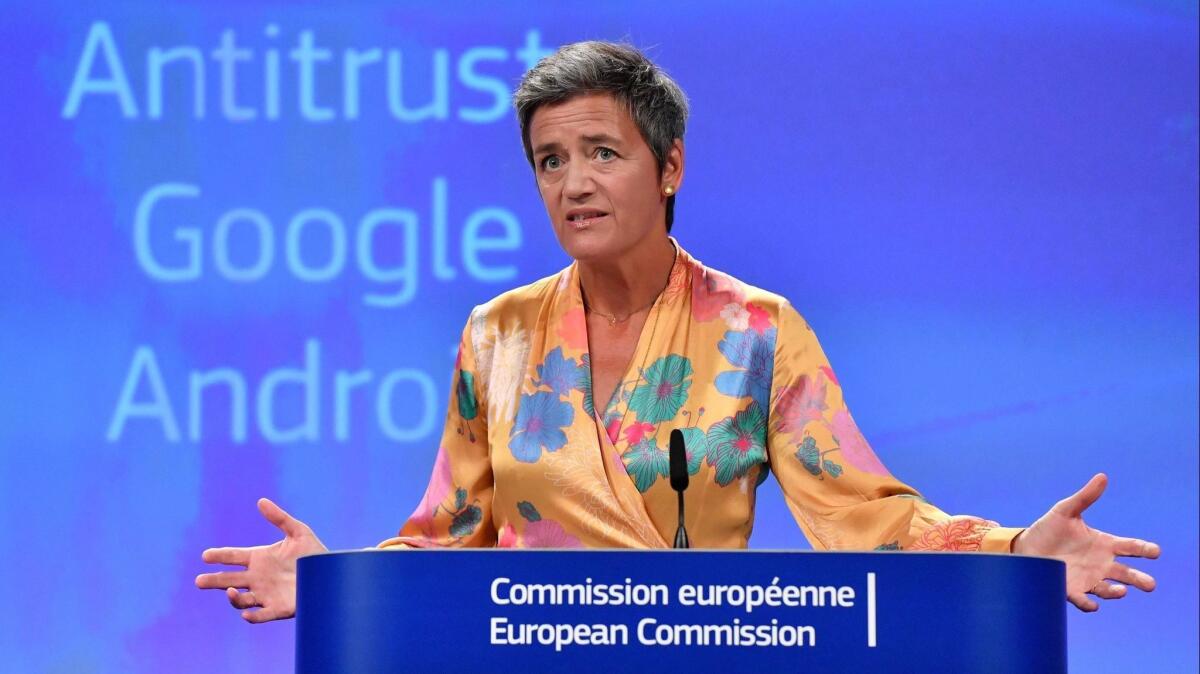Google’s European fine raises pressure on U.S. regulators to examine the company’s business practices

Google’s woes are no longer limited to Europe.
The tech giant now faces heightened scrutiny at home on the heels of the European Union’s record $5-billion fine levied on the company Wednesday.
Joseph Simons, chairman of U.S. Federal Trade Commission, said his agency would “read what the EU put out very closely.” He said that at a House subcommittee hearing hours after authorities in Brussels ordered Google to change the way it makes Android device makers pre-install its search and Web browsing apps.
“In the antitrust world, most of the problematic conduct occurs where firms are big and have market power,” said Simons, referring to the duopoly of Google and Apple in the mobile software market. “This is one of the places we would focus.”
Separately, Sen. Richard Blumenthal (D-Conn.) urged the FTC to step up its scrutiny of Google’s business practices, raising the specter that the search giant could again have to answer to charges that it violates antitrust and anticompetition statutes in the U.S. — questions it has mostly averted.
“The unprecedented fine imposed by Europe sends a clear message that Google and other tech companies cannot continue to abuse international competition law,” Blumenthal, a member of the Senate Judiciary subcommittee on antitrust, competition policy and consumer rights, said in a prepared statement.
“The FTC should end its decade of inaction and deference, and confront the mounting evidence that Google’s business practices have stifled robust competition in a market that is critical to our economy and society,” he added. “Europe should not be alone setting the agenda.”
The response is one of the strongest signs yet that the tougher oversight Silicon Valley companies have encountered in Europe could ripple to the U.S.
Congress was criticized for failing to penalize Facebook after its co-founder and chief executive, Mark Zuckerberg, testified about his company’s role in the Cambridge Analytica data scandal earlier this year (though the company is being probed by the FTC, FBI and the Securities and Exchange Commission).
In 2013, the FTC concluded a 19-month investigation about Google favoring its own services in search results by determining the Mountain View, Calif., company did no harm to consumers.
By contrast, the European Commission levied a $2.7-billion fine on Google last year for promoting its shopping services in search results over its rivals.
The European Union also introduced strict new privacy laws in May that limit the ability of companies like Facebook to compile and share personal data.
“These companies are getting very large and some of the behaviors are probably going to be watched by regulators,” said Lana Reeve, principle advisor and general counsel at Maco.la Capital, which works with American and European companies. “It’ll be interesting to see how our regulators respond. They don’t want to have a chilling effect on U.S. businesses, but at the same time they need to foster innovation that doesn’t harm consumers.”
In Wednesday’s ruling, Google was given 90 days to stop what the European Commission said were illegal contracts with device manufacturers. Failure to do so would result in penalties of up to 5% of daily worldwide revenue for Alphabet Inc., Google’s parent company.
At question are arrangements between Google and Android device manufacturers such as Samsung, LG and HTC. Google provides the Android operating system for free in exchange for guarantees the device makers pre-install Google’s search and web browser apps. The manufacturers also gain access to the Google Play Store, the main portal for third-party Android apps.
European regulators said the deals helped ensure Google’s dominance in internet search while also stifling innovation and competition.
“Google has used Android as a vehicle to cement the dominance of its search engine,” Margrethe Vestager, the European Union’s commissioner on competition, said in prepared remarks. “These practices have denied rivals the chance to innovate and compete on the merits. They have denied European consumers the benefits of effective competition in the important mobile sphere. This is illegal under EU antitrust rules.”
Google argues that the practice provides device and app makers the ease of uniformity in software — and it disagreed that it stifled competition, arguing that no one is prevented from downloading rival apps.
“The Commission’s Android decision ignores the new breadth of choice and clear evidence about how people use their phones today,” Google Chief Executive Sundar Pichai said in a blog post.
By dominating search and browsing, Google can collect data and serve more ads — which provides Alphabet with 86% of its revenue, according to the company’s first-quarter financial results.
Mobile ad spending worldwide will reach $184 billion this year, according to eMarketer, and Google is expected to capture one-third of that revenue.
Google says that’s why it can provide Android to device makers for free, warning that prices for phones and tablets could rise as a result of the European ruling.
It’s unclear if another mobile platform can step in and challenge Google and Apple, which commanded 53% and 43%, respectively, of the U.S. mobile market last year, according to eMarketer.
Larry Downes, project director at the Georgetown Center for Business and Public Policy, said the EU’s fine could inspire regulators elsewhere, including in Asia, to take a harder look at Google.
“We have seen South Korea and Japan follow suit in some of the earlier fines the EU levied against Silicon Valley technology companies,” he said.
Ultimately, Downes said U.S. regulators will struggle to pin antitrust violations on Google and other tech giants as long as rules here are guided by consumer prices first and foremost.
“The U.S. has consistently stuck to the principles of antitrust laws that the EU seems to have abandoned: you can’t find an antitrust violation if consumers aren’t being harmed,” he said. “If companies are not raising prices for consumers, but in fact lowering prices, as in the case of Amazon, or they’re not charging at all, in the case of Google, then you cannot find an antitrust violation.”
UPDATES:
2:05 p.m.: This article was entirely rewritten by Los Angeles Times staff.
This article was originally published at 4:05 a.m.








